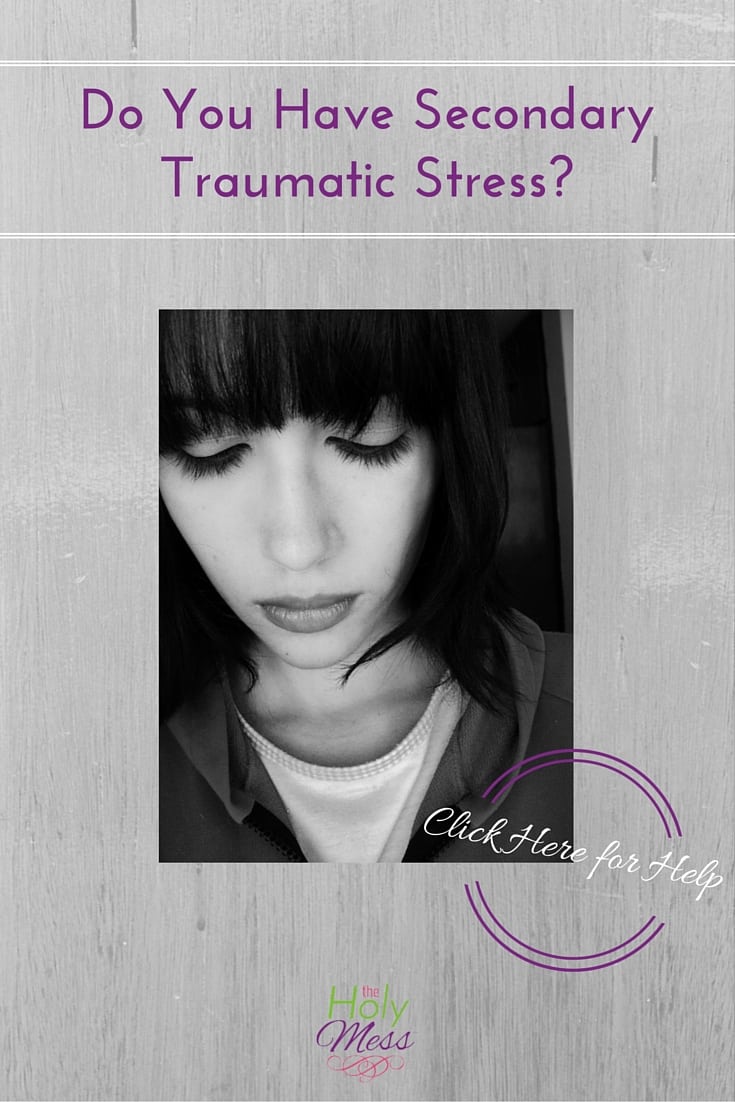- You Are Not Alone (with Depression & Anxiety)
- Depression Does Not Define You
- What Does Depression Look Like?
- 10 Encouraging Bible Verses to Ease Depression
- Navigating Tough Parenting of Teens: When Your Daughter Wants to Dye Her Hair Blue
- How to Manage Depression and Chronic Pain
- Truths About Depression: Stuff You Don’t Want to Hear
- I Got Punched in the Face This Weekend
- Straight Talk About How to Survive Heartbreaking Grief
- For a Day When You Need Motivation
- Sometimes Grief Comes From Unexpected Places
- For Parents of a Teen Who Had a Near Miss
- 10 Simple Ways to Bring Creativity to Your Life
- A Depression Solution: Speak!
- Q & A with a Therapist about Depression
- 4 Realistic Steps to Motivation When You Are Depressed {Based on Research!)
- 101 Ways to Get in a Good Mood When Depressed
- Is it Okay to Avoid Pain?
- How Can I Serve If I’m Depressed?
- Do You Have Angry Depression?
- A Room Full of Love: Thoughts After a Loved One’s Suicide
- Top 5 Offbeat I’m Depressed and Nothing’s Gonna Stop Me Now Movies
- What You Need to Know about Postpartum Depression
- Why You Need More Mental Flexibility
- How To Stop Stress Eating
- How to Exercise When You Don’t Feel Like It – 10 Workout Motivation Tips
- A Cure for Panic Attacks: The Potato Chip Method
- Can’t Sleep? Read This at 3:00 AM (When Depression Causes Insomnia)
- Secondary Traumatic Stress: How I Found Healing
- You Were Set Free For a Reason: A Daily Devotion about Freedom in Christ
- If You Write, Please Read This. (Plus, a FREE GIFT for All!)
Secondary Traumatic Stress is the emotional stress you experience when you hear about the trauma of another person. Is secondary trauma affecting you today? Read on to learn about how I recognized my secondary stress and then found healing and hope.

Do You Have Secondary Traumatic Stress?
Here are some examples of phone calls I received when I was a foster parent:
“We have an 11 year old in need of a foster placement…and she’s 6 months pregnant. Can you take her?
“We are looking for a foster home for 11 month old twins. You would be their 8th placement.”
“We need someone to go to the emergency room and pick up a 6 year old girl who was sexually abused.”
“We have a baby waiting at the hospital with 4 broken bones and a concussion. Will you take her?”
As foster parents, we received many phone calls like these. The stories of children who had been abused, neglected, and traumatized seemed never-ending.
Someone always needed more of us.
My Early Warning Signs of Trauma
After we had been foster parents for about 6 months, I began to experience terrible stomach pains.
I tried changing my diet, but it didn’t help. I tried various over the counter medications, to no effect. Finally in desperation I went to see my doctor.
She found nothing physically wrong.
I knew I was under a great deal of stress as a foster parent, and we talked about self-care all the time in support groups and with our supervisors. My husband and I attempted to get respite (not an easy task) but still...it seemed somehow almost wrong to focus on myself.
Compared to what these children were going through, facing life and death illness, injury, abuse, and trauma, who was I to complain? I struggled to face the reality of my own needs.
I was a traumatized foster mom.
What is Secondary Traumatic Stress?
According to the National Child Trauma Stress Network:
Secondary traumatic stress is the emotional duress that results when an individual hears about the firsthand trauma experiences of another. Its symptoms mimic those of post-traumatic stress disorder (PTSD).
National Child Trauma Stress Network
All of us experience secondary trauma at times. Just listening to stories on the news and of family and friends can result in traumatic stress. Due to our sinful world, trauma is around us all the time.
If you are in a service industry of any type (nurse, doctor, firefighter, therapist, teacher), have a special needs child, work with individuals with high needs, are in church or missions ministry, you are dealing with secondary trauma on a regular basis.
Secondary traumatic stress, sometime called Secondary PTSD – although this is not an official diagnosis – is (again according to the National Child Trauma Stress Network):
Accordingly, individuals affected by secondary stress may find themselves re-experiencing personal trauma or notice an increase in arousal and avoidance reactions related to the indirect trauma exposure. They may also experience changes in memory and perception; alterations in their sense of self-efficacy; a depletion of personal resources; and disruption in their perceptions of safety, trust, and independence.
National Child Trauma Stress Network
How to Know if You Have Secondary PTSD
People with secondary trauma, or Secondary PTSD, experience some of the same symptoms as the person who went through the original trauma.
Think about it. As parents of a special needs child, you see your child go through endless tests and medical procedures. Wouldn’t you do anything to take his or her place? This is traumatic.
As a foster parent, teacher, pastor, or social worker, hearing stories day after day of abuse is traumatic. This depletes the best of us.
Secondary PTSD was first recognized in wives of soldiers who were diagnosed with PTSD. As a parent who is living with a child with PTSD, I can tell you this makes total sense. When you live with someone who is constantly hyper-vigilant, and you never know when the next crisis is going to blow, you become hyper-vigilant yourself. Years of this type of life takes a heavy toll.
Compassion Fatigue is another name for this type of secondary trauma, often considered a more mild form of caregiver burn-out.
Signs of Secondary Trauma
According to compassionfatigue.org, signs to be aware of are:
Normal symptoms present in an individual include:
- Excessive blaming
- Isolation from others
- Receives unusual amount of complaints from others
- Bottled up emotions
- Voices excessive complaints about administrative functions
- Substance abuse used to mask feelings
- Compulsive behaviors such as overspending, overeating, gambling, sexual addictions
- Poor self-care (i.e., hygiene, appearance)
- Reoccurrence of nightmares and flashbacks to traumatic event
- Chronic physical ailments such as gastrointestinal problems and recurrent colds
- Mentally and physically tired
- In denial about problems
In retrospect, there is no question that both my husband and I dealt with secondary traumatic stress from our time as foster parents, adoptive parents, parents of special needs children, and years of ministry.
We are learning to step back and take better care of ourselves. This is not an easy learning process, but we are both working on it.
Help for Secondary Trauma
If you recognize you are dealing with secondary trauma, here are helpful steps to take toward healing and recovery.
1. Recognition is the first, most important step.
During my years as a foster parent, I knew self-care was important. Yet while I was in the middle of it, I didn’t understand the deep level of depletion I experienced. Taking better care of myself did not seem possible. I had 100 excuses why I could not take time away from my family and children in order to care for myself.
When I started therapy and lost 100 pounds, I gained a whole new perspective. (Read my weight loss story here.)
2. Have compassion for yourself.
Secondary trauma is no joke. Have more compassion for yourself and the difficulty of what you are do and experience. Don’t make comparisons like, “Other people have it worse,” or “It’s not that bad.” Hard is hard is hard.
You cannot do it all. You do not have to save everyone.
3. Seek help.
Check out the resources below. See your doctor. An online support group of people who “get it” is a lifesaver.
4. Appreciate compassion satisfaction.
Compassion satisfaction is the joy we receive in taking care of others. This is good. Take pleasure in the fact that you are a blessing and changing the lives of others in a significant way. Savor the little moments.
Are you experiencing secondary trauma? How is it affecting you? Share in the comments below.

The Hope Toolbox

Throughout this series, each of us is creating My Hope Toolbox, your own personal list of resources you can use for the bad days. Whether it’s go for a run, listen to music, or sit in the sunshine, we all need activities we know will help move us toward healing, even when we don’t FEEL like doing them.
What will you add to your Hope Toolbox today?
Today’s Bible Memory Verse
“Tell everyone who is discouraged, ‘Be strong and don’t be afraid! God is coming to your rescue…”
Isaiah 35:4
Today’s Journaling Prompt
Are you dealing with secondary trauma that needs to be addressed? Be compassionate with yourself.
Helpful Resources
Compassion Fatigue Awareness Project — Very good resource that has several self-assessment quizzes online and self-assessment tools.
The National Child Traumatic Stress Network: Secondary Traumatic Stress
More Posts You Will Love
Still Standing: Healing after the Toughest Parenting
Understanding Kids with Trauma History
- You Are Not Alone
- Depression Does Not Define You
- What Does Depression Look Like?
- 10 Encouraging Bible Verses to Ease Depression
- When Your Daughter Wants to Dye Her Hair Blue
- How to Manage Depression and Chronic Pain
- Truths About Depression: Stuff You Don’t Want to Hear
- I Got Punched in the Face This Weekend
- Straight Talk About How to Survive Heartbreaking Grief
- For a Day When You Need Motivation
- Sometimes Grief Comes From Unexpected Places
- For Parents of a Teen Who Had a Near Miss
- 10 Simple Ways to Bring Creativity to Your Life
- A Depression Solution: Speak!
- Q & A with a Therapist about Depression
- Research Shows 4 Keys to Motivation When You Are Depressed
- 101 Ways to Boost Your Mood Immediately
- Is it Okay to Avoid Pain?
- How Can I Serve If I’m Depressed?
- Do You Have Angry Depression?
- A Room Full of Love: Thoughts After a Loved One’s Suicide
- Top 5 Offbeat I’m Depressed and Nothing’s Gonna Stop Me Now Movies
- What You Need to Know about Postpartum Depression
- Why You Need More Mental Flexibility
- How to Eat Healthy When You Don’t Feel Like It
- How to Exercise When You Don’t Feel Like It
- A Cure for Panic Attacks: The Potato Chip Method
- Can’t Sleep? Read This at 3:00 AM
- Do You Have Secondary Traumatic Stress?
- You Were Set Free For a Reason
- If You Write, Please Read This. (Plus, a FREE GIFT for All!)
Foster & Adoptive Parents

Do you parent a child who's experienced stress, trauma, or grief?
*Foster & adoptive parents, grandparents raising grandkids, if your child has experienced trauma or loss -- this resource is JUST FOR YOU!
*FREE Super-helpful printables! 8 resources you can print and use today.
*Receive helpful updates specifically for foster and adoptive parents.











Wow, I didn’t know that was a “thing,” but that makes total sense. I can’t even imagine. Thanks for sharing such an honest glimpse into what life is like for someone who so selflessly cares for others!
Thanks for your comment, Brittany, and your willingness to be empathetic to what others are going through.
I have just read your article, WOW what an eye opener…. Explains alot THANK YOU !!! Looking forward to learning more…
Thank you for your comment, Robert. You might also enjoy the “Still Standing” series on my website.
Wow never heard of this. I have PSTD from my past but didn’t know I had this secondary thing too. I never had foster children but I had a very sick mother who needed care and I always had this big lump in my stomach (as well as IBS) for 6 years just always waiting for the call of she had died. Being parent to your own parent is hard (even though she was taken care of by the hospital/nursing home).
Today I have adrenal fatigue- hopefully recovering soon. It’s crazy how the body responds to all of this stress. Thanks for sharing.
I’m thinking about sharing my story too soon in my blog.
Blessings, Vanessa Raphael
It’s really true that our bodies respond to stress. I’m glad you are finding your way to recovery. HUGS! It’s not an easy road.
Very eye opening. I think self care is always the last thing we think of as moms.
I’ve been there! When my husband was ill, I called it ‘Chemo-brain by Proxy’. Because I didn’t get help, I suffered a lot longer than I needed to.